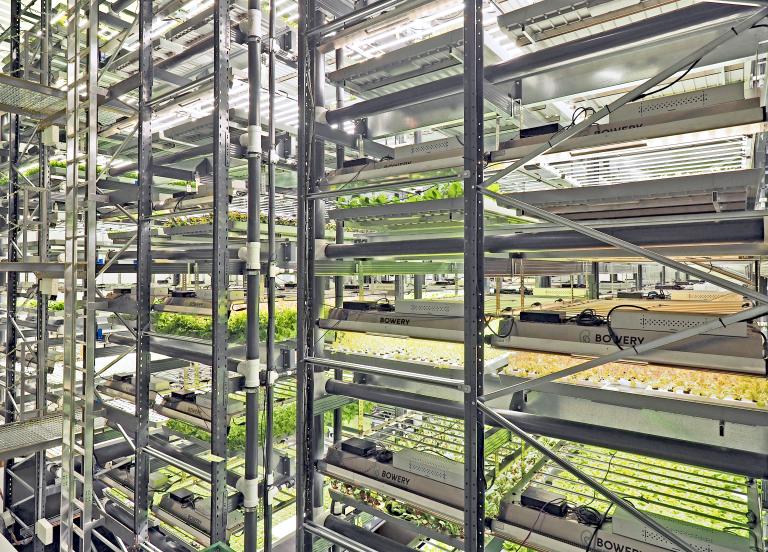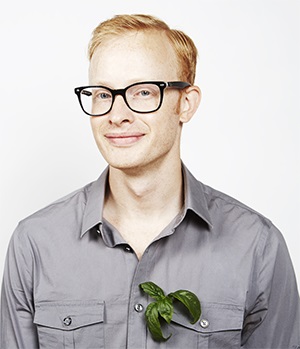
Brian Falther ‘10 is the co-founder of Bowery Farming, a modern, indoor farming company that grows vegetables and greens with less water and less space than traditional farming.
The New York-based company was founded in 2015. Farms in New Jersey and the New York City area grow non-genetically modified produce using vertical rows, LED lights, no pesticides, and efficient techniques. The produce uses 95 percent less water than traditional agriculture, and the company is 100 times more productive on the same footprint of land.
 Falther studied Mechanical Engineering at Kettering and he launched three different food production-related startups, including BioNysus and Future Tech Farm.
Falther studied Mechanical Engineering at Kettering and he launched three different food production-related startups, including BioNysus and Future Tech Farm.
He answered questions about Bowery Farming and how his time at Kettering University helped him become an entrepreneur.
What were the most valuable experiences at Kettering University?
Three vivid experiences at Kettering completely changed the trajectory of my life.
The first involved the tail-end of my time on campus in which there was this program introduced called “Entrepreneurship Across the Curriculum.” Several of the classes I took involved entrepreneurial-based projects. I’m confident that’s what catalyzed any dormant notions of entrepreneurship to emerge from within me. There are a few examples of this that have stuck with me:
In senior seminar, one of the books we read in Dr. Ezekiel Gebissa’s class was entitled “The Power of Unreasonable People.” This book in particular had a really big impact on my view of the world at the time. I think it ultimately led to cultivating a passion of entrepreneurship in me through refusing to accept the status quo.
The most impactful classroom experience I had was the class taught by Business faculty members Larry Navarre and Art Demonte called “Business Innovations and New Ventures.” This was probably my favorite class at Kettering. We learned the fundamentals of pitching (they had an investor that came in and critiqued our pitches live) and how to develop a business plan along with building out a financial model to support it. My group conceptualized a company called DISCovery, and the product that we had created for it was a disc-golf disc that had a tracking device in it which could be tracked by your cell phone when you inevitably lose your disc in the trees or tall weeds. There were moments when we seriously thought about pursuing the design and manufacturing of the idea into a real business.
The second experience was studying abroad in Germany at Hochschule Ulm. It was an absolutely incredible time in my life. Living in Europe for a term allowed me to increase my worldly empathy in a way that I’ve been able to more successfully navigate international business relationships throughout my career.
The third and most valuable experience, was meeting my wife, Julie. Both of us were members of the climbing club and we we met on one of the annual West Virginia trips. She was a B-Section Electrical Engineering student and I was an A-Section Mechanical Engineering student—we normally wouldn't have crossed paths otherwise. She alone has had the single greatest impact on everything I do, and I wouldn’t be where I am today without her.
How has Kettering made an impact on your career?
The co-op experience at Kettering has had an asymmetrically-positive impact on my career. Having the opportunity to gain a tremendous amount of application specific real-world experience is invaluable. I worked for two automotive suppliers in my co-op career. That experience is what allowed me to know extremely early on in my career that I absolutely didn’t want to work in automotive. I had discovered my ‘anti-career’ earlier than one may have in a more typical environment.
Kettering offers the capacity to gain more than two years experience in the field, coupled with the fact that the classroom environment is much more fast-paced than a typical schooling environment. Those two things combined have certainly enabled me to operate in a fast-paced environment.
When did you found Bowery Farming and what is your role?
I started experimenting with the idea that eventually became Bowery in 2010. In the process of discovering Bowery, I iterated through three separate attempts at building a business on the exact same idea from 2010 to 2014 before ultimately co-founding Bowery with Irving Fain and David Golden in early 2015.
My role at Bowery historically seems to evolve about every six months, and it’s been an incredible ride. It began with designing, building, and operating the very first proof-of-concept grow system in the basement of our house in Grand Rapids. From there it evolved to designing and building our first large-scale commercial indoor farm to helping to lead the design and engineering of our largest production facility. I love this type of work because of the all the interaction and integration of different competencies. The most recent evolution of my role at Bowery has been focused within systems engineering. I’ve been specializing in automation and robotics for our grow system.
Where did your interest in this kind of company come from and where the idea originated from?
Ever since I was young I’ve always had an interest in starting a company, but I didn’t really have a solid idea of what I wanted to work on until in late 2010. I came across a TED talk called “The Other Inconvenient Truth” given by Dr. Jon Foley. In his talk, Dr. Foley mentions that if we continue to farm the same way we do today, we’re going to run out of arable landmass by the year 2050. The notion of this idea really struck me and stuck with me—I couldn’t shake it. So, I started to think about what solutions could look like to solve this problem and started to look for companies that were working on solving this already because I wanted to work there.
What I found was, at that time, there really wasn’t anyone working on this in the way that I thought the problem could be solved. I figured I could do it myself. So I really became obsessed with learning about food production systems, designing grow systems, and learning to grow. I felt that if agriculture was able to be coupled with technology, software, and fundamental manufacturing principles, then the world could realize a food production system more efficient than humanity has ever seen. I had this ‘A-ha’ moment when I realized I could leverage my experience in the world of automotive manufacturing and apply that to food production. There were a bunch of unoccupied warehouses, and I had originally started thinking about how to create a fully automated indoor food production system. At the time I was in my early 20s, and it was really tough to convince anyone that I was ready to raise the millions of dollars needed to execute on that vision. It would be several years later when I realized that raising money is not my core competency. I needed to find someone who could execute that part of building a business in a way that I knew I wasn’t going to be able to. So I was fortunate to have met Irving Fain, who’s done an incredible job for us as co-founder and CEO.
Bowery received Series B round of financing - what does this mean for the company?
Yes! In December, we announced a $90 million Series B fundraiser, bringing our total funding amount to $117.5 million to-date. As access to safe, fresh food becomes even more critical, Bowery will use these funds to expand our operation quickly and sustainably, to meet the demands of an ever-growing population. We’ll be opening farms in new cities by the end of 2019. We’re going to continue tackling complex agricultural and environmental issues through investing in technology and innovation across the company, maintaining the highest level of food safety, and hiring top talent.
What do envision for the future of Bowery Farming?
I think the most exciting aspect of Bowery stems from the fact, everybody eats. They always have and always will. The core mission of Bowery is to grow food for a better future by revolutionizing agriculture. What we envision is a farm in every major city in the world, and ultimately I foresee us continuing to accelerate the world’s transition to a more sustainable food production system for generations to come, on Earth, and perhaps even beyond.
Anything else you'd like to share?
You can find out more about Bowery at https://boweryfarming.com/. I tweet on occasion, feel free to reach out to me at @BrianFalther.